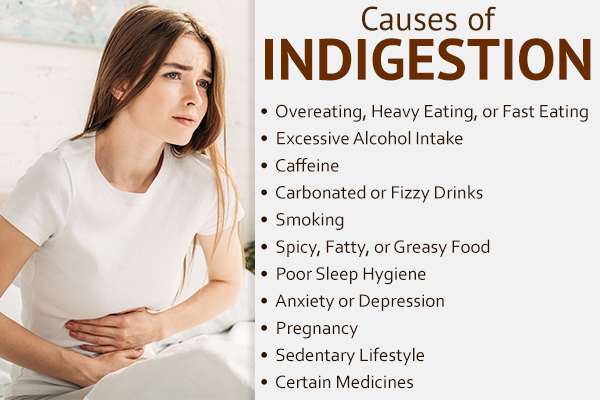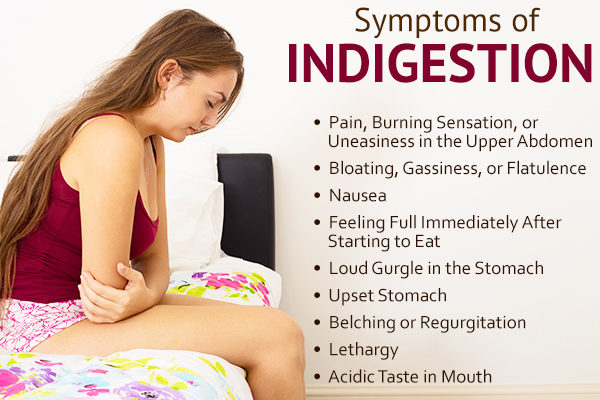In this article:
Indigestion or dyspepsia is not a condition but a collection of gastrointestinal symptoms that arise due to improper digestion.

It is another name for an upset stomach, which may be the result of an underlying digestive issue, such as GERD, or wrong eating habits, such as eating or drinking too much. The symptoms and causes of indigestion vary from person to person.
Types of Indigestion
Indigestion can be of two types: (1)
1. Organic dyspepsia
Organic dyspepsia is triggered by a definite underlying condition, such as pancreatic or biliary disorders, gastric or esophageal cancer, intolerance to food or drugs, gastroesophageal reflux disease, peptic ulcer, and other infectious or systemic diseases.
2. Functional dyspepsia
Functional dyspepsia is indigestion with no clear cause, which can be pathophysiological or pathogenic in nature. Pathophysiological causes include delayed gastric emptying, weak gastric accommodation to a meal, and sensitivity to gastric distension, lipids, or acids.
Pathogenic causes include genetics, infections due to Helicobacter pylori or other organisms, inflammation, and psychosocial factors.
This chronic condition is referred to as functional due to the absence of any apparent structural abnormalities that can explain the symptoms. (2) This article covers occasional mild indigestion due to common causes.
Causes of Indigestion
Some common causes of indigestion include the following:

- Overeating or heavy eating
- Eating too fast
- Spicy, fatty, or greasy food
- Overconsumption of alcoholic beverages
- Caffeine
- Carbonated or fizzy drinks
- Smoking
- Poor sleep hygiene
- Anxiety
- Depression
- Pregnancy
- Sedentary lifestyle
- Certain medicines: aspirin, ibuprofen, and other NSAIDs (Motrin, Advil, and Excedrin) and antidepressants (specifically SSRIs)
Other factors also play a role in indigestion, including:
- Stomach or duodenal ulcers
- Stomach irritation (gastritis)
- Inflammation of the gallbladder (cholecystitis)
- Gastritis, hiatal hernia, gallstones, gastroesophageal reflux disease, irritable bowel syndrome (IBS), thyroid dysfunction, chronic pancreatitis, stomach cancer (rare), esophageal cancer, pancreatic cancer, celiac disease, inflammatory bowel disease, and biliary causes
- Obesity
Symptoms of Indigestion
Indigestion is a common condition and can occur in both men and women of all ages, although some people are more prone to it. It can occur occasionally or sometimes as often as every day. (3)

Pain, bloating, and fullness after meals are the most common symptoms of indigestion. The discomfort it causes varies in intensity. The abnormal functioning of the gastrointestinal tract that results in indigestion causes the following symptoms:
- Pain, burning sensation, or uneasiness in the upper abdomen
- Bloating, gassiness, or flatulence
- Nausea
- Feeling full immediately after starting to eat
- Loud gurgling in the stomach
- Upset stomach
- Belching or regurgitation
- Lethargy
- Flatulence
- Acidic taste in the mouth
Conventional Treatment for Indigestion
Depending upon the diagnosis, the doctor may prescribe any of the following treatment:
- Proton-pump inhibitors (omeprazole) and H2 blockers (ranitidine or famotidine)
- Antacids, which relieve the symptoms by neutralizing the stomach acids
- Antibiotics, if the indigestion is due to a bacterial infection
- Prokinetics (bethanechol and metoclopramide), which help empty the stomach faster
- Switching the pain reliever, if aspirin or other NSAIDs are causing the indigestion
Diagnosing Indigestion

To diagnose indigestion, the doctor will inquire about your symptoms, eating habits, and medical history. The doctor may ask about the following:
- Family history of cancer
- Difficulty in swallowing
- Bleeding from the digestive tract
- Increased frequency of vomiting
- Unintentional weight loss
The doctor will also conduct a physical examination and run some tests, especially when the cause of the indigestion is unknown. The tests may include:
- Upper gastrointestinal endoscopy, X-ray, and CT scan to determine any abnormality or obstruction
- Blood tests to check for metabolic disorders
- A stool antigen test and a urea breath test to check for Helicobacter pylori
- A hydrogen breath test to check for small intestinal bacterial growth
The doctor may refer you to a gastroenterologist depending on the diagnosis.
Duration of Indigestion
Indigestion may persist for years or even a lifetime, repeatedly occurring with varying degrees of intensity. However, some people only suffer from indigestion when triggers are present.
Complications of Indigestion
Indigestion usually does not have any serious complications, but the discomfort and uneasiness caused by it can significantly hamper your dietary intake, productivity, and overall quality of life.
Complications may occur as a consequence of an underlying health problem that may be causing indigestion.
When to See a Doctor
Mild indigestion is a common problem and can be dealt with easily. However, when indigestion lasts for more than 2 weeks, consult a doctor. The following symptoms can indicate a serious condition:
- Black and tarry stools
- Difficulty swallowing
- Multiple bouts of vomiting with blood
- Constant abdominal pain
- Unexplained weight loss
- Rapid breathing
- Sweating
- Yellow skin and eyes (jaundice)
- Iron deficiency anemia
- Pain in the upper part of the body including the jaw, neck, chest, and arm
It is especially important to consult a doctor if the patient is older than 50 years or if there is a lump in the stomach area.
Final Word
Indigestion is a common health problem that may affect any age group. The discomfort indigestion causes include nausea, bloating, and dehydration. Although indigestion is not a serious condition, it can take a toll on your health and can leave you exhausted.
To find relief from a mild case of indigestion, some over-the-counter medicines, lifestyle changes, and remedies using ingredients available in the kitchen have been found to be helpful. It is crucial to be consistent in your effort to prevent indigestion and keep track of its triggering factors.

- Was this article helpful?
- YES, THANKS!NOT REALLY


